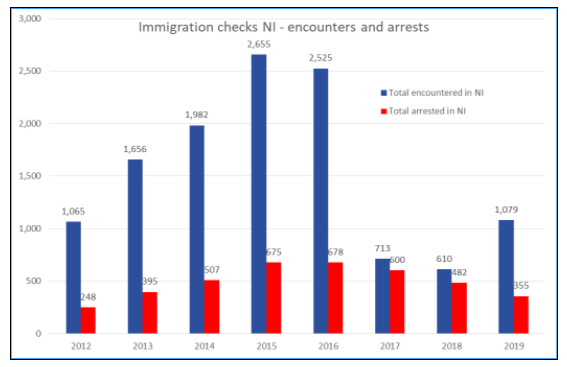BELFAST had a higher rate of immigration checks than London and other major UK cities, new figures furnished by the Home Office suggest.
Official figures on immigration checks in Northern Ireland, provided for the first time under Freedom of Information legislation, reveal the majority of checks were carried out in Belfast.
Home Office figures show that Immigration Enforcement officers carried out 12,285 checks across Northern Ireland between January 3, 2012 and November 1, 2019.
Of these checks 10,610 or 86% occurred in Belfast while a low number of checks were carried out in border cities, such as Newry (233) and Derry (70). Checks occurred across Northern Ireland, including Craigavon (206), Newtownards (107), and Enniskillen (86).
Immigration Enforcement is a division of the Home Office responsible for enforcing immigration law in the United Kingdom. Immigration Enforcement officers have the power to check an individual’s immigration status if they have reasonable grounds to suspect that someone is living or working illegally in the UK or attempting to gain entry illegally through UK ports and airports.
Just one third of all immigration checks in Northern Ireland led to arrests with the remaining two thirds seeing the individual stopped being released.
The figures come despite the fact that Northern Ireland has the second lowest population of non-British nationalities in the UK (6%) after Wales (4%). An estimated 115,000 non-British/Irish nationals were living in Northern Ireland in June 2019.
The Home Office said immigration checks were necessary to protect the Common Travel Area but confirmed that checks were not conducted at the Irish land border. Immigration Enforcement officers also conduct illegal working and residential checks.
Other UK cities
The data also shows that Belfast had the third highest number of immigration checks across 12 UK cities between 2012 and 2016.
Compared to Home Office data previously released to the Bristol Cable and Bureau of Investigative Journalism, Belfast ranked in third place after London (58,463) and Manchester (9,509).
The number of checks in Belfast was greater than in other major UK cities including Birmingham (7,516), Glasgow (4,762), Sheffield (4,687), Cardiff (4,437), Liverpool (4,360), Newcastle (3,494), Leeds (2,799), Nottingham (1,382) and Bristol (1,143) over this time period.
The figures do not include encounters and arrests by UK Border Force Officers. Border Force is a separate division of the Home Office, responsible for frontline border control operations at air, sea and rail ports in the United Kingdom.
Higher rate
Further analysis showed that Belfast had the highest rate of immigration checks out of the 12 UK cities when population is taken into account.
There were 50 immigration checks for every 10,000 population in Belfast between 2012 and 2016 – this was close to four times the rate observed in London (13 checks per 10,000 population) and almost one and a half times the rate of Manchester (35 checks per 10,000 population).
Nationality
Romanian, Chinese and British nationals were checked by Immigration Enforcement officials more than any other nationality in Northern Ireland between 2012 and 2019.
Romanian (1,313) and Chinese (1,299) nationals collectively accounted for one in five of all nationalities checked during this time period, while British citizens (1,013) ranked as the third most checked nationality.
By comparison 222 Irish citizens were stopped in the same period. People from Northern Ireland are normally entitled to British or Irish citizenship, or both. Immigration Enforcement officers record the nationality stated on a person’s ID when stopped. It is understood that where nationality is not stated, such as a driver’s licence, the officer will ask the person to state their nationality. This only applies where the officers do not believe an immigration offence has occurred.
Arrest rates, however, varied greatly. Just 17% of Romanian nationals stopped were arrested, compared to 41% of Chinese nationals stopped. While British citizens cannot be immigration offenders they can be arrested for criminal offences. Of the 1,013 British citizens stopped just 21 or 2% were arrested in Northern Ireland over this period.
Data for 11 other UK cities (not including Belfast) found that British citizens were stopped more than any other nationality, leading to accusations of racial profiling by immigration officers.
Immigration checks should be intelligence-led. Home Office guidance states that “reasonable suspicion can never be supported on the basis of personal characteristics. It must rely on intelligence or information about, or some specific behaviour by, the person concerned”.
Spike
The Home Office figures also reveal a spike in immigration checks in Northern Ireland in 2015 (2,655) and 2016 (2,525). This spike coincided with a UK government pledge to clampdown on immigration as part of its Brexit campaign.
In the following two years the number of immigration checks in Northern Ireland saw a dramatic fall (down 75%) while arrest rates improved. The number of people stopped was 713 in 2017 and 610 in 2018; the number of people arrested was 600 in 2017 and 482 in 2018. This saw arrest rates increase to between 79-84% in both years, up substantially on the average arrest rate observed in the previous five years (25%).
The sharp fall in checks follows concerns by the Independent Chief Inspector of Borders and Immigration in 2016 about an over reliance on tip-offs and allegations from members of the public.
The Home Office did not explain or comment on the significant fall in immigration checks over this period but confirmed that immigration enforcement policies had not changed.
A spokesperson for the Home Office said: “There has been no policy change during the period outlined and all our operational activity is intelligence led.”
- To view the associated news piece on this issue, please click here.
- Maresa Fagan is a journalist who works for the Irish Examiner. Her Twitter handle is @aranliathroid.
- Luke Butterly is a freelance journalist in Belfast. His Twitter handle is @lukejbutterly.


